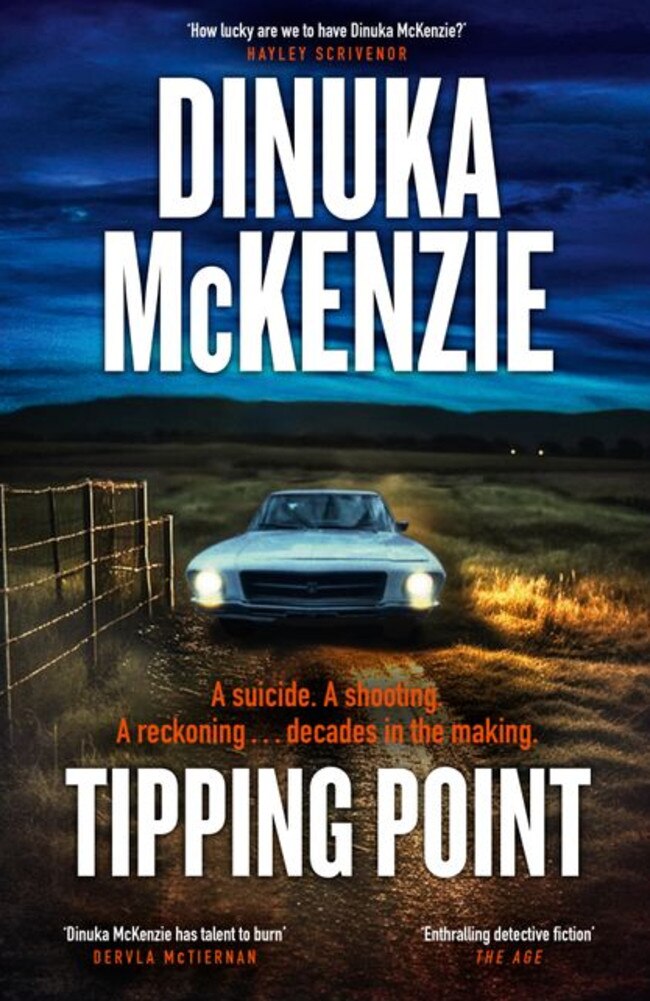‘What’s not to like?’: Dinuka McKenzie on the deep fascination of crime stories
Dinuka McKenzie makes her living from writing about crime – and she reckons there’s a confronting truth in all of us that explains our fascination with the dark side of humanity.
Books
Don't miss out on the headlines from Books. Followed categories will be added to My News.
Everyone is capable of wrongdoing … It’s just a matter of circumstance and the right pressure points.
It’s a simple truth that underpins every crime narrative from small-town mysteries, police procedurals, psychological suspense to dark thrillers. As much as we like to think of ourselves as separate from criminals, the potential exists in all of us. That possibility, it seems, is what fuels our ongoing fascination with crime stories.
As a genre, crime fiction gives both writers and readers explicit permission to engage with the darker aspects of human nature. To satisfy our fundamental curiosity to know. The who and how, but especially the why.

It’s certainly what drew me to the genre. As a reader, crime fiction allows me to engage with the broader world through the stories of the individuals caught in the storm – often society’s most vulnerable and marginalised. As a writer, I am interested in unravelling the thread of how people end up where they do. To make readers ask themselves: How would I react in that situation? If circumstances were different could that have been me?
We are taught to fear the monster out there. What I find compelling and possibly more chilling is the monster hiding in plain sight in our homes, in our trusted institutions, and in our social circles. “They seemed like such a nice, quiet family”: the cliche interview grab from a shocked neighbour when a particularly horrific crime is revealed to have been occurring behind closed doors. The reality is these are people who walk amongst us and who we have established relationships with, however tangentially. We chat with them at school pick-up, grab our daily coffees from them, work with them, and in some cases go home to them.

Writing crime fiction allows me the opportunity to delve behind the mask of ordinary lives, to uncover the good, the bad, and the unending layers of grey in between.
My police procedural series (The Torrent, Taken, Tipping Point) set in the NSW Northern Rivers hinterland explore the lives and lies of ordinary people. The decisions taken (and not taken) in a moment of crisis that can turn the trajectory of a person’s life compelling them down a particular path, and the repercussions that can ripple through a community, affecting individuals, friends, and family of both the victim and perpetrators. My novels draw on contemporary concerns in a small-town context. This includes external stresses like the increasing vulnerability of regional areas to natural disasters (flood and bushfires), as well as the ties of community that can create conditions of complicity and minding your own – which can allow issues to fester and hide, such as domestic abuse, mental health, identity and misogyny.
A detective protagonist is a particularly useful tool in this instance as it allows a crime writer access to a wide pool of characters: the detective themselves and their loved ones, the broader police and investigation team, the victim, suspects and their families, expanding out to the town itself. Each life affected to a different degree by the case.

The detective protagonist of my novels is a mother of young children and a woman of mixed Sri Lankan-Australian heritage: Kathryn Aneesha Miles – Kate to her friends. Navigating mother guilt, working around gender expectations, and dealing with the everyday tragedies of police work is a standard day in the life of Kate Miles. For Kate, the job that she loves is also the thing that invariably places her in conflict with the needs of her family and is the central tension running through each novel. When her estranged brother, Luke, ends up embroiled in a suspicious death in Tipping Point – the latest book in the series – Kate has to grapple with the version of the sibling she grew up with and the adult he has become.
To me compelling crime fiction leans into the uncomfortable, because very little in life is easy or straightforward, least of all anything involving humans. With crime fiction the morally grey is served up with a cracking puzzle, a dose of thrills and danger, justice served (at least until the sequel), and a mirror held up to society. What’s not to like?
Dinuka McKenzie’s latest novel Tipping Point is out now, published by HarperCollins.
On the topic of crime, our new Book Of The Month is Anna O by Matthew Blake. Get 30% off the RRP at Booktopia with the code ANNAO. Only on ISBN 9780008607807. Not with any other offer.
And tell us why you love crime stories – or why you don’t – at The Sunday Book Club group on Facebook.
Originally published as ‘What’s not to like?’: Dinuka McKenzie on the deep fascination of crime stories


